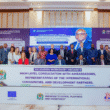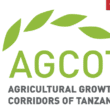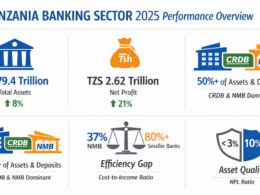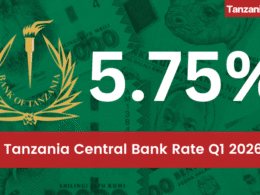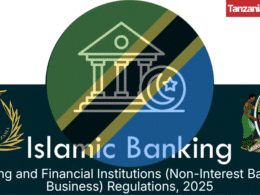TanzaniaInvest sat down with Ibrahim Mwangalaba, the Managing Director of Maendeleo Bank, to discuss the bank’s journey towards empowering growth and financial inclusion in Tanzania.
The Bank was established in 2008 by the Evangelical Lutheran Church and began operations as a regional bank in 2013. It was the first Tanzanian company and bank to be listed on the Dar es Salaam Stock Exchange through the Enterprise Growth Market Window.
The bank primarily serves the micro, small, and medium enterprise (MSME) markets in Dar es Salaam.
Mwangalaba sheds light on Maendeleo Bank’s unique “machinga” initiative, which supports informal traders, its specialized products for small businesses, and the bank’s vision for a digitally inclusive future.
Additionally, he shares the bank’s commitment to corporate social responsibility and its vision to reshape the Tanzanian banking sector by fostering innovation and customer-centricity.
Finally, he highlights the opportunity to finance his bank and his growing lending portfolio.
TanzaniaInvest: Maendeleo Bank recently announced impressive financial results for 2022, with net profit after tax increasing 160% year-on-year to TZS 1.4 billion. Can you walk us through the key drivers behind this strong performance?
Ibrahim Mwangalaba: Several factors contributed to the higher profitability.
Firstly, as overall business conditions in Tanzania continued to recover from the pandemic, more of our clients across sectors like agriculture, manufacturing, and trading were able to grow their revenues and repay their loans. With customers better able to service their debt, our non-performing loans reduced and we did not need to set aside large provisions for bad debts. This had a direct positive impact on our bottom line profit.
“As overall business conditions in Tanzania continued to recover from the pandemic, more of our clients across sectors like agriculture, manufacturing, and trading were able to grow their revenues.”
In addition, as the economy rebounded, we saw demand for new financing from businesses picking up pace. We were able to grow our lending by approving credit facilities across various sectors like agriculture, education, clean energy financing, transport, and hospitality. This expansion of our loan book to high-quality, income-generating customers also boosted our interest income during the year.
Another key driver was the accelerated rollout of our agency banking model since its introduction in 2019. Over the past year, we increased the number of active agents providing banking services on our behalf from 750 to over 1,300 nationwide. With agency banking, customers can conduct transactions like deposits, withdrawals and payments within their local communities rather than having to visit a branch.
“Over the past year, we increased the number of active agents providing banking services on our behalf from 750 to over 1,300 nationwide.”
The rapid growth of the agent network has allowed us to expand our customer base and deposit mobilization. Agents facilitate cash deposits and withdrawals, so as more customers use them, our low-cost deposits have increased. We’ve also earned higher transaction fee income as customers undertake more banking transactions through these agency banking channels.
In addition, the adoption of our digital banking channels like mobile banking also gained momentum during 2022. More retail and MSME customers are utilizing mobile banking for their day-to-day banking needs like balance checks, money transfers, loan repayments and online purchases. This has similarly supported customer acquisition, deposit growth and transaction income for the bank.
We’ve also focused on designing more tailored lending products to meet the needs of specific market segments, for example, small businesses and informal retail traders locally known as machinga. Last year, we launched small loans for machinga secured against their movable wooden trading table tables at markets, the so-called “Kizimba’” These tables are issued to them through their representative Machinga Association in specific market areas and serve as their place of business.
“We’ve also focused on designing more tailored lending products to meet the needs of specific market segments, for example, small businesses and informal retail traders.”
By accepting these tables as collateral against loans of TZS 100,000 to TZS 4 million, we’ve been able to provide affordable, convenient financing solutions to over 4,000 machingas. It has positioned us as the bank of choice for them rather than traditional lenders. The product fulfils a previous unmet funding need and has received encouraging uptake in a relatively short span.
TanzaniaInvest: What were the key financial metrics for Maendeleo Bank in 2022 and what is the growth outlook for 2023?
Ibrahim Mwangalaba: In terms of key financial parameters, our total loan book grew by 37% from TZS 44 billion in 2021 to TZS 60.4 billion at the end of 2022. Driven by our agency banking expansion, our customer deposits also increased by 33% from TZS 59 billion to TZS 79 billion last year.
This supported balance sheet growth, with total assets crossing the TZS 100 billion milestone to reach TZS 107 billion in 2022, up 23% from TZS 87 billion previously. Our total income grew by 30% to TZS 33 billion, while profit after tax was TZS 1.4 billion compared to TZS 580 million in 2021.
For 2023, we have set a loan target of TZS 77 billion, representing growth of around 27% year-on-year. Our deposit mobilization efforts will continue through agency banking and we project deposits to reach TZS 92 billion this year.
“For 2023, we have set a loan target of TZS 77 billion, representing growth of around 27% year-on-year.”
We recently received regulatory approval to open a new branch at Mbagala area, which will further easy access to our banking services which will improve customer base. We’re also launching Internet banking services by July 2023, which will provide an alternative digital banking channel for tech-savvy clients.
On the cost side, we aim to maintain our cost-to-income ratio below 55% as mandated by the Bank of Tanzania for payment of dividends. We also intend to keep non-performing loans below the 5% threshold through prudent credit underwriting to ensure loan book quality.
TanzaniaInvest: What funding plans does Maendeleo Bank have to support the strong loan growth momentum?
Ibrahim Mwangalaba: Our loan growth outlook exceeds projected deposit mobilization for 2023, so we are engaging with various potential funders to secure additional financing. We already have some long-term 3-year funding lines from local banks and microfinance institutions that provide growth capital for lending.
“Our loan growth outlook exceeds projected deposit mobilization for 2023, so we are engaging with various potential funders to secure additional financing.”
However, to boost access to more affordable 10-year financing, we are currently in discussions with several private commercial banks and development finance institutions. We see significant unmet demand for credit from MSMEs and informal enterprises that aligns closely with our brand promise of powering business, and empowering lives.
If we can finalize agreements with these partners, we should be able to source additional long-term financing of 8 to 10-year maturity. This will give us the funding capacity to scale lending to over TZS 90 billion in the medium term and maintain strong growth momentum.
TanzaniaInvest: Where does Maendeleo Bank have a competitive advantage over other banks in serving MSME clients?
Ibrahim Mwangalaba: As a relatively small, domestic bank with around 100 employees, we have an organizational structure that enables fast decision-making and lean operations. Opening new accounts and processing MSME loans is done with minimal bureaucracy and turnaround times are very quick. This gives us an edge compared to larger state-owned and international banks.
We also spend time understanding MSME sub-segments like machinga, women entrepreneurs, farmers etc. to create tailored products that suit their needs. Traditional banks have a more generic lending approach but we design innovative solutions based on our on-the-ground insights; for instance, the movable collateral loans for machinga, and the small group loans for female entrepreneurs without requiring collateral. This product innovation targeted at priority sectors gives us an edge in financial inclusion.
“We spend time understanding MSME sub-segments like machinga, women entrepreneurs, farmers etc. This product innovation targeted at priority sectors gives us an edge in financial inclusion.”
Overall, our entire business model is built around supporting MSME growth and empowering lives rather than corporate banking or elite consumer lending. This purpose-led approach enables us to serve Tanzania’s dynamic SME sector effectively.
The bank is in the final stages of introducing Internet Banking and a Mobile App, both designed to embrace digital innovation and enhance customer convenience at all times. These products will speed up the bank’s customer acquisition from above 70,000 customers to 100,000 customers by 2024.



